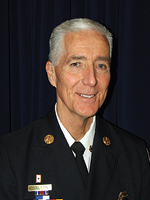
John Locke argued that government exists to protect “life, liberty, and property.” The American genius and founding father Thomas Jefferson enshrined that in our Declaration of Independence with the following words: “We hold these truths to be self-evident, that all men are created equal, that they are endowed by their Creator with certain unalienable Rights, that among these are Life, Liberty and the pursuit of Happiness …. That to secure these rights, Governments are instituted among Men, deriving their just powers from the consent of the governed.”
We firefighters, career and volunteer, are a function, a part of the government selected and controlled by the governed that is so charged with protecting life, liberty, and property. How we do it is complex, not complicated; those two things are different and tough to understand sometimes.
A simple way to look at it is the example of a complicated gas combustion engine, say a 289 V8. It is complicated to break down and put back together correctly. Tearing down an engine the first few times is tough, but you do A, which leads to B, which leads to C, and soon you are done. Complex is completely different. This is how the real world works, what we call forward, not how things work back in the classroom, training room, or laboratory, where we are imagining how the world will act and where we make plans and develop procedures. We operate forward in the real world, where unexpected things come together all the time and strange stuff happens.
Forward is where we have competing goals, put the fire out, extend a rescue, throw ladders or use the stairs, hit it from the outside first or try to push through. Forward is where we initially have limited resources—not enough rigs, people, or tools. Forward is where our information is incomplete: Folks are inside or not, are savable or not; fire is controllable or beyond our control, burning five minutes or 25 minutes. Perhaps worst of all, forward is where time is working against us: We must make decisions fast; a lot of times it is intuitive and emotional and we use Recognition Primed or Naturalist Decision Making, “System One,” as Kahneman termed it.
The decisions made in a complex, forward situation in crisis are often misunderstood in hindsight. Folks are attributed motives and intentions that are often false and scurrilous and lend no value to learning or restoration.
Like the first Jews and the first Americans, firefighters have first a covenant, a sacred obligation, a primary obligation between us and our fellow citizens. We have second a contract, a fiduciary obligation, a secondary obligation between us and our customers. There is a difference between a customer and a provider in a social contract and a citizen and a citizen in a sacred covenant with one another.
If you will, some biblical political theory from Rabbi Jonathan Sacks. In biblical Israel, the people came to Samuel and said, “Appoint us a king,” and Samuel got really upset, and God got really upset; but, God said to Samuel, “Spell out what having a king will actually mean … and if they’re still willing to pay the price, give them a king,” which is what happened. What happened in the days of the Prophet Samuel is precisely a social contract, exactly along the lines set out by Thomas Hobbes in “The Leviathan.”
People are willing to give up certain of their rights and transfer them to a central power, a king, a government, who undertakes to ensure the rule of law internally and the defense of the realm externally. 1 Sam. 8 is the first recorded instance in all of history of a social contract.
The Jews, Americans, and firefighters enter a sacred covenant first; the social contract is second. And those two things are often confused, but actually they’re quite different. In a contract, people make an exchange. You pay your plumber, you make an exchange. A covenant isn’t like that. It’s more like a marriage than an exchange. Firefighters have contracts with governments to work certain hours or take prescribed pay. But we have a covenant with our fellow citizens and our fellow firefighters: It involves life, humanity, not money or things.
A covenant is sacred, respecting the dignity and integrity of others in a bond of loyalty and trust. A covenant isn’t about me. It’s about us. A covenant isn’t about interests. It’s about identity. A covenant isn’t about me, but about all of us together. And covenants are sacred because they involve sacrifice—real sacrifice, real blood, and treasure sacrifices.
As Thomas Paine pointed out, they’re different things. The first—society, covenants—is about our desires; and the latter—government, contracts—is about our wickedness. Neither side on this miscommunication inside the fire service is bad or immoral, neither is right nor wrong. The confusion all has to do with when we are respecting our social contract and when we are honoring our sacred covenant.
It was John Stuart Mill who wrote that “one of the worst offences against freedom is to stigmatize those who hold the contrary opinion as bad and immoral men.” Firefighters must be completely aware and consciously respectful of these two universal forces: one to control our wickedness and weakness and one to raise up our lives and our eternal souls.
The good rabbi teaches us the difference between covenants and contracts. These two influences are involved in every fire we attend. When we consider them along with the intent of the firefighters involved, understanding how the fire occurred to them at the time, we learn. When we look back and find fault, we blame. We can learn or blame, but we can’t do both. Honoring a sacred covenant supersedes respecting a contract.


